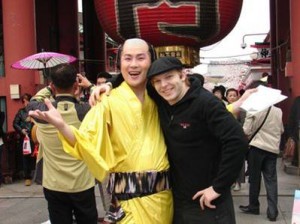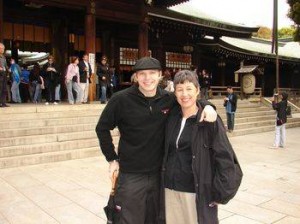Greg Furr was one of my students on my first EF tour, “King Arthur’s Britain,” in 1994. After he graduated from high school in 1996, Greg went to Georgia Tech and earned a degree in electrical/computer engineering in 2001. I contacted Greg when I was planning my 2007 tour to Japan. I knew he was living in Japan and I wanted him to meet my group (and bring him a “care package” from home). Not only will Greg serve as our private tour guide for our free day in Tokyo on our April tour to Japan, he will be a special guest at my pre-departure meeting next month. The timing of his trip home to visit his parents is perfect for my group. I asked Greg, via e-mail, to answer some questions about the impact of his EF tours and travel on his life.
1. How many EF tours did you go on in high school? Where did you go? Any good memories?
I went on at least two trips with EF, one to France and one to England. I have lots of fond memories. Many of them centered around being with my friends and experiencing a new part of the world, differences in culture and such. Honestly, I don’t remember so many of the historic sites we visited except for Stonehenge and the Louvre, but I very much remember the meals, the bus rides, the hotel stays, the local tour guides, and the times we got to run around places like in Trafalgar Square (still remember all those pigeons), Piccadilly Circus, etc.
2. What impact do you think those tours had on your life?
Well, I think it gave me a sense of just how small my world really was, especially coming from a town like Cheraw. Even if you don’t like what else is out there, at least you can be aware of and experience the fact that people live and conduct their lives differently from you. Some people are happy to live in a small familiar world and there’s absolutely nothing wrong with that, but traveling allows you to make a real comparison. I think that was important for me. Another thing I took away from the tours was that the tour itself was really just a small taste of what those places were like. I think you realize that very quickly. Sure, you can hit all of the tourist sites, take some pictures, and say “Yeah, I went there,” but really one week or two weeks is not enough to truly experience what it is like to live there. Visiting those countries on the tours left me hungry for the opportunity to dive in on my own, spend a whole summer, a semester of college, or something like that, and get to know local people, hang out where they hang out, shop where they shop, eat where they eat, etc. Even though you are, in fact, doing a lot of that on the tour, I guess it’s a little different because you have someone guiding you and you are with familiar people that are much like yourself.
3. Why is it important for students to have a “world view”?
As far as the importance of having a “world view” is, I think that it IS important because we live in a world that’s bigger than we often realize. Especially with advancements in transportation and communication making the world ever more interconnected, it is going to become more and more the case that we (the people of the world) have to deal with each other on a daily basis. This is not only true with regard to business, but you can already see that when you are a member of a social networking site (e.g. Facebook) or simply browsing YouTube. However, I think it is even more important to have a solid understanding of what it means to be who you are and where you are from. This can really only be done if you have something to compare it to. I’m sure it’s already easy for students from Cheraw to tell you what it means to be from Cheraw versus another city like McBee or Columbia, or what it means to be from South Carolina versus California (maybe), but on a larger scale, what it means to be an American.
4. How did you become interested in Japan? How did a small-town guy from Cheraw end up in a big city like Tokyo?
Good question. In high school, as you may know, I was into karate at the recreation department and I was always into video games (and remain so), many of which are made in Japan and are translated into English for the US market. When I went off to college, I got into Japanese anime because it was very much unlike any of the “cartoons” we were familiar with growing up and are more geared to young adults. So my interest mainly came from those three things. Really, it was just a passing interest until one of my best friends who was graduating a semester before me told me that he intended to travel to Japan to teach English for a year before trying to start his career. I thought, “Wow! That sounds really fun.” I was so envious, but I thought there was no way my parents would ever allow me to do something like that. Then one month before I graduated, the 9/11 attacks happened. The economy turned upside down, and engineers were being laid off left and right. Even my friends who had near 4.0 GPAs could not find companies willing to hire them because they were competing against engineers with 2-3 years of experience. Having a GPA considerably lower than a 4.0, I didn’t stand a chance. So I contacted my friend and asked them if his company in Japan was still hiring. The rest is history.
5. What are you now doing in Tokyo? Any plans of returning to the USA?
I now work for an international patent law firm after doing my time as an English teacher (four years) and studying Japanese (three years). It’s good because I get to put a lot of the engineering I studied into use without actually having to design anything as an engineer. Mainly, I review patent specifications (applications) that have been translated from Japanese into English and make sure that they are technically accurate and use the proper technical English terms of that field. Of course, there are also many grammatical mistakes since almost all of the translators are Japanese. Originally, I had hoped that by working here , one day my Japanese would raise to a level at which I could do translations myself, but considering all of the technical words I would have to learn that most Japanese don’t even know, I’ve pretty much given up on that idea. In fact, most of my colleagues can speak enough English that I don’t have to speak Japanese on a daily basis, unfortunately.
As of right now, I have no plans to return to the US, not because I don’t want to live in the US again. I very much love my home country. I’m just not really sure what kind of work I would do there after being here for so long. I’m quite comfortable where I am.
6. What advice do you have for the current generation of students in my classes about travel and the world outside of Cheraw?
That, contrary to popular belief, there is indeed a world outside of Cheraw (that’s not meant to be condescending, simply humorous), and before deciding that you already live in the best place on Earth, you should try to experience as much of that world as possible. If you don’t like what the rest of the world has to offer, you can always go back home.
7. Do you have any good travel tips for Japan?
1.) Don’t buy traveler’s checks or bring lots of cash to exchange at the airport (it’s a complete rip off on the exchange rate). There is a Citibank ATM at Narita airport and you can take cash directly from your account in yen at a better rate than the exchange counters would ever give you. Japanese post office ATMs will also allow you to do the same. However, those two types are the only ATMs you can use.
2.) Be quiet on the train. Everyone else is.
3.) Don’t assume that people around you can’t understand what you are saying just because you don’t understand what they are saying. This can get you into trouble. However, before speaking to someone, you should ask them if they speak English.
4.) Feel free to eat at McDonald’s once while you are here, but eat somewhere else the rest of the trip. It is my opinion that Tokyo has some of the world’s best food and I’m not only talking about Japanese food, but literally food from around the world.
5.) In some of the shopping districts you will visit, don’t be afraid to explore the upper or lower levels of buildings. There is often more than just what is on the street level.
6.) Use common sense. Anything that would be unacceptable in Cheraw is probably also unacceptable here. If you get arrested trying to buy alcohol or stealing something, no one is going to be able to help you.
7.) Like it or not, you will be representatives of all foreign people in the eyes of Japanese. Try to remember that your actions (good or bad) will reflect on people other than yourself.
It’s nice to know how an EF tour can change a student’s life. As his former teacher, I am so very proud of Greg. Greg certainly gets an A+ in global citizenship!
Related articles


